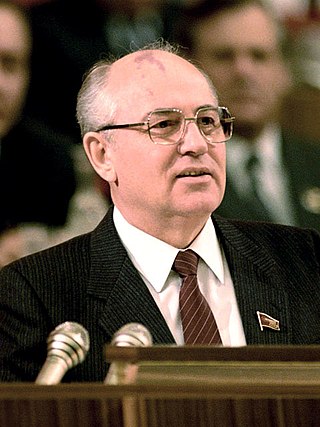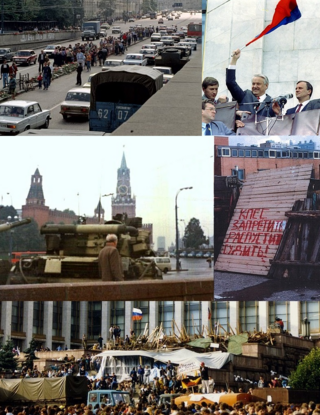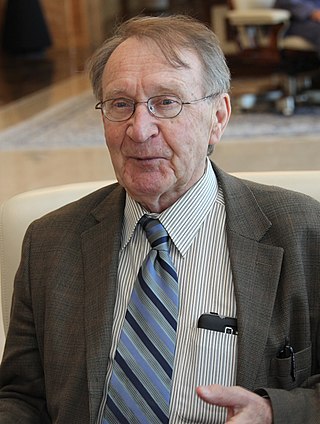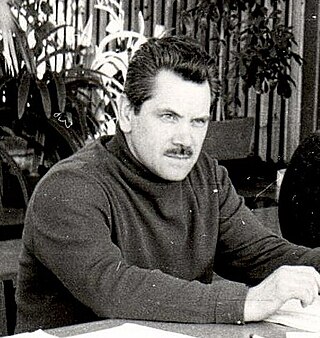Glasnost is a concept relating to openness and transparency. It has several general and specific meanings, including a policy of maximum openness in the activities of state institutions and freedom of information and the inadmissibility of hushing up problems. In Russian the word 'гласность' has long been used to mean "openness" and "transparency". In the mid-1980s, it was popularised by Mikhail Gorbachev as a political slogan for increased government transparency in the Soviet Union within the framework of perestroika, and the calque of the word entered into English in the latter meaning.

Mikhail Sergeyevich Gorbachev was a Soviet and Russian politician who served as the last leader of the Soviet Union from 1985 to the country's dissolution in 1991. He served as General Secretary of the Communist Party of the Soviet Union from 1985 and additionally as head of state beginning in 1988, as Chairman of the Presidium of the Supreme Soviet from 1988 to 1989, Chairman of the Supreme Soviet from 1989 to 1990 and the only President of the Soviet Union from 1990 to 1991. Ideologically, Gorbachev initially adhered to Marxism–Leninism but moved towards social democracy by the early 1990s.

Perestroika was a political reform movement within the Communist Party of the Soviet Union (CPSU) during the late 1980s widely associated with CPSU general secretary Mikhail Gorbachev and his glasnost policy reform. The literal meaning of perestroika is "restructuring", referring to the restructuring of the political and economic systems of the Soviet Union, in an attempt to end the Era of Stagnation.

The 1991 Soviet coup d'état attempt, also known as the August Coup, was a failed attempt by hardliners of the Soviet Union's Communist Party to forcibly seize control of the country from Mikhail Gorbachev, who was Soviet President and General Secretary of the Communist Party at the time. The coup leaders consisted of top military and civilian officials, including Vice President Gennady Yanayev, who together formed the State Committee on the State of Emergency (GKChP). They opposed Gorbachev's reform program, were angry at the loss of control over Eastern European states and fearful of the USSR's New Union Treaty which was on the verge of being signed. The treaty was to decentralize much of the central Soviet government's power and distribute it among its fifteen republics.

Moscow State Institute of International Relations (MGIMO) is an institute of higher education located in Moscow, Russia. The institute is run by the Russian Ministry of Foreign Affairs.

Pavel PalazhchenkoorPalazchenko is a former high-level Soviet conference interpreter who was the chief English interpreter for Mikhail Gorbachev and Soviet foreign minister Eduard Shevardnadze from 1985 and 1991.

Jack Foust Matlock Jr. is an American former ambassador, career Foreign Service Officer, teacher, historian, and linguist. He was a specialist in Soviet affairs during some of the most tumultuous years of the Cold War, and served as the U.S. Ambassador to the Soviet Union from 1987 to 1991.

Relations between the Soviet Union and the United States were fully established in 1933 as the succeeding bilateral ties to those between the Russian Empire and the United States, which lasted from 1776 until 1917; they were also the predecessor to the current bilateral ties between the Russian Federation and the United States that began in 1992 after the end of the Cold War. The relationship between the Soviet Union and the United States was largely defined by mistrust and tense hostility. The invasion of the Soviet Union by Germany as well as the attack on the U.S. Pacific Fleet at Pearl Harbor by Imperial Japan marked the Soviet and American entries into World War II on the side of the Allies in June and December 1941, respectively. As the Soviet–American alliance against the Axis came to an end following the Allied victory in 1945, the first signs of post-war mistrust and hostility began to immediately appear between the two countries, as the Soviet Union militarily occupied Eastern European countries and turned them into satellite states, forming the Eastern Bloc. These bilateral tensions escalated into the Cold War, a decades-long period of tense hostile relations with short phases of détente that ended after the collapse of the Soviet Union and emergence of the present-day Russian Federation at the end of 1991.

Roald Zinnurovich Sagdeev is a Russian expert in plasma physics and a former director of the Space Research Institute of the USSR Academy of Sciences. He was also a science advisor to the Soviet President Mikhail Gorbachev. Sagdeev graduated from Moscow State University. He is a member of both the Russian Academy of Sciences and the American Philosophical Society. He has worked at the University of Maryland, College Park since 1989 in the University of Maryland College of Computer, Mathematical, and Natural Sciences. He is also currently a senior advisor at the Albright Stonebridge Group, a global strategy firm, where he assists clients with issues involving Russia and countries in the former Soviet Union. Sagdeev was married to, and divorced from, Susan Eisenhower, granddaughter of Dwight D. Eisenhower. Sagdeev was the recipient of the 2003 Carl Sagan Memorial Award, and the James Clerk Maxwell Prize for Plasma Physics (2001).

The Plekhanov Russian University of Economics is a public research university in Moscow, Russia. It was founded in 1907 by entrepreneur Alexei Vishnyakov as the first finance-specialized college in the Russian Empire.
Marshall Irwin Goldman was an American economist and writer. He was an expert on the economy of the former Soviet Union. Goldman was a professor of economics at Wellesley College and associate director of the Harvard Russian Research Center. Goldman received his Ph.D. in Russian studies from Harvard University in 1961. Goldman was well known for his study of the career of Mikhail Gorbachev. His books on the former Soviet Union include The USSR in Crisis: The Failure of an Economic System, Lost Opportunity: What Has Made Economic Reform in Russia So Difficult, and Petrostate.

Spaso House is a listed Neoclassical Revival building at No. 10 Spasopeskovskaya Square in Moscow. It was originally built in 1913 as the mansion of the textile industrialist Nikolay Vtorov. Since 1933, it has been the residence of the U.S. Ambassador to the Soviet Union, and since 1991, to the Russian Federation. The building belonged to the USSR and later Russia and, under the 1985 lease contract, the U.S. was supposed to pay 72,500 Soviet roubles per year, which by 2001 was the equivalent of about $3, which the U.S. had failed to pay in 1993. In 2004, the two sides concluded a new 49-year lease that was said to be based on a joint assessment of the property's value; the rent rate was not disclosed.

Igor Korchilov is a top-level Russian-English conference interpreter who worked with Soviet leader Mikhail Gorbachev from 1987 to 1990, a period that covered the Cold War era.
Bridge (Мост) is a musical film, the first USA/USSR student co-production.

Moscow State Pedagogical University or Moscow State University of Education is an educational and scientific institution in Moscow, Russia, with eighteen faculties and seven branches operational in other Russian cities. The institution had undergone a series of name changes since its establishment in 1872.
The following lists events that happened during 1991 in the Soviet Union and Russia.

Anatoly Sergeevich Chernyaev was a Russian politician and writer, member of the Central Committee of the Communist Party of the USSR, who became foreign-policy advisor to General Secretary Mikhail Gorbachev in 1986-1991.

Raisa Maximovna Gorbacheva was a Soviet-Russian activist and philanthropist who was the wife of Soviet leader Mikhail Gorbachev.

Kutafin Moscow State Law University (MSAL) is a coeducational and public research university located in Moscow, Russia. It was founded in 1931. MSAL was renamed after Oleg Kutafin in 2012 and was then known as Kutafin University. Its rector is Viktor Blazheev.

The Helsinki Summit was a private, bilateral meeting between American President George H. W. Bush and Soviet President Mikhail Gorbachev that took place in Helsinki, Finland on September 9, 1990. Due to the vested interests of both the Soviet Union and the United States in the Gulf Crisis' resolution, August 1990 Iraqi invasion of Kuwait was the primary topic of discussion for the leaders during the Helsinki Summit. The concerted efforts at easing American-Soviet tensions in the aftermath of the Cold War was another prominent topic, among other notable current events. At the summit's conclusion, Presidents Bush and Gorbachev produced a document of joint statements that illuminated the areas in which the leaders had committed to aligning their foreign policy goals. The summit was followed by a press conference wherein members of the media questioned Presidents Bush and Gorbachev about the content of their meeting and the justifications for their joint statements.
















